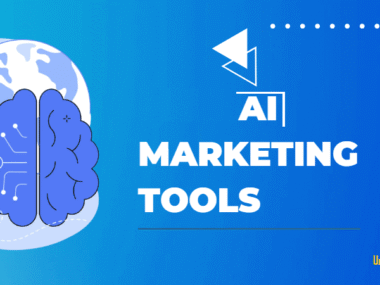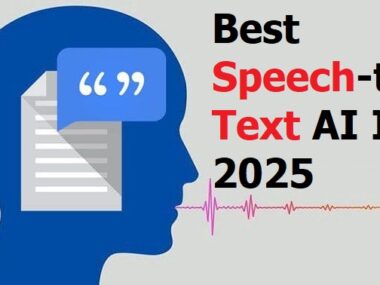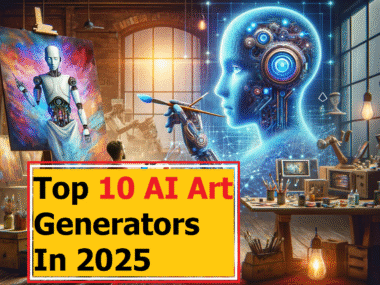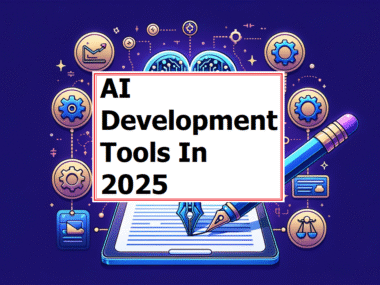Artificial Intelligence (AI) has become a cornerstone of modern innovation, driving efficiencies and creating new opportunities across various sectors. From machine learning and data analysis to content generation and automation, AI tools are revolutionizing the way businesses operate and individuals create.
Whether you are a marketer, developer, content creator, or business leader, understanding and utilizing the best AI tools can provide a significant competitive edge.
In this article, we’ll explore the top 10 AI tools that are leading the charge in AI technology. We’ll cover what these tools do, how they are used, and why they are indispensable for anyone looking to stay ahead in today’s fast-paced technological landscape.
Table of Contents
- What Are AI Tools?
- Why Use AI Tools?
- Top 10 AI Tools to Boost Your Productivity
- ChatGPT
- Jasper AI
- Canva (AI-Powered Design)
- Grammarly
- Hootsuite (AI for Social Media Management)
- IBM Watson
- Google Cloud AI
- Adobe Sensei
- Zapier (AI Automation)
- DeepL Translator
- How AI Tools Are Shaping Industries
- Conclusion
What Are AI Tools?
AI tools are software applications powered by artificial intelligence technologies such as machine learning (ML), deep learning, and natural language processing (NLP). These tools can perform tasks that would typically require human intelligence, such as recognizing patterns in data, generating content, and automating repetitive tasks.
The purpose of AI tools is to increase efficiency, reduce human error, and enable smarter decision-making by processing vast amounts of data and drawing insights from it. Today, AI tools are used across various industries, including healthcare, marketing, e-commerce, content creation, and customer service.
Why Use AI Tools?
There are numerous benefits to integrating AI tools into your workflow, whether you’re running a business or working as an individual contributor:
1. Efficiency
AI tools can automate time-consuming tasks, allowing businesses and individuals to focus on more strategic initiatives.
2. Cost Savings
By automating tasks and processes, AI can significantly reduce the need for manual labor and expensive resources.
3. Data-Driven Insights
AI tools analyze data to provide actionable insights that help improve decision-making and enhance performance.
4. Personalization
Many AI tools offer personalized experiences based on user data, which can be leveraged to engage customers more effectively.
5. Scalability
AI tools can handle large-scale tasks without the need for constant human intervention, making them ideal for businesses looking to scale their operations.
Top 10 AI Tools to Boost Your Productivity
Here are the top 10 AI tools that are transforming various industries and helping businesses and individuals improve productivity, creativity, and efficiency.
1. ChatGPT
ChatGPT, developed by OpenAI, is a state-of-the-art language model designed to generate human-like text. It can be used for a wide range of applications, including content generation, customer support, and language translation. Whether you need help writing articles, generating ideas, or answering customer queries, ChatGPT is a versatile AI tool that can assist with virtually any text-based task.
Key Features:
- Human-like text generation
- Content creation (blog posts, social media content, etc.)
- Language translation and summarization
- Chatbots for customer support
Why Use It:
ChatGPT is one of the most advanced conversational AI tools available, and its ability to generate high-quality text in seconds makes it an invaluable tool for marketers, writers, and business owners.
2. Jasper AI
Jasper AI is a powerful content generation tool that uses advanced machine learning to create blog posts, marketing copy, and social media content. It’s specifically designed to help marketers and content creators streamline the writing process, making content creation faster and more efficient.
Key Features:
- AI-powered content generation
- SEO optimization
- Supports multiple languages
- Personalized content suggestions
Why Use It:
Jasper helps businesses and content creators save time on writing tasks while ensuring that the content is engaging, optimized for SEO, and relevant to their audience.
3. Canva (AI-Powered Design)
Canva is a popular design tool, and its AI-powered features have taken it to the next level. From automatic image resizing to smart templates, Canva’s AI tools simplify graphic design, making it accessible to both beginners and professionals.
Key Features:
- AI-powered image resizing
- Smart templates and design suggestions
- Drag-and-drop interface
- Easy collaboration on designs
Why Use It:
Canva’s AI features allow users to create professional-looking designs with minimal effort, making it a go-to tool for social media managers, marketers, and content creators.
4. Grammarly
Grammarly is an AI-powered writing assistant that helps users improve their writing by offering grammar, punctuation, and style suggestions. Whether you’re drafting an email, writing a blog post, or composing a report, Grammarly’s AI can ensure your content is clear, concise, and error-free.
Key Features:
- Grammar and spelling checks
- Style and tone suggestions
- Plagiarism detection
- Real-time feedback and corrections
Why Use It:
Grammarly helps ensure that your writing is professional and polished, saving you time on revisions and improving the overall quality of your content.
5. Hootsuite (AI for Social Media Management)
Hootsuite is a social media management platform that uses AI to help users schedule posts, track performance, and engage with their audience. With its AI-powered analytics, Hootsuite allows businesses to measure the success of their social media campaigns and optimize their strategy.
Key Features:
- AI-powered post scheduling and recommendations
- Social media analytics
- Sentiment analysis of posts and comments
- Multi-platform support
Why Use It:
Hootsuite’s AI tools make social media management more efficient, allowing businesses to focus on content creation while automating engagement and performance tracking.
6. IBM Watson
IBM Watson is one of the most established names in AI, offering a suite of AI-powered tools for businesses. Watson is known for its cognitive computing capabilities, which allow it to understand, reason, and learn from data. It’s used in a wide range of industries, including healthcare, finance, and customer service.
Key Features:
- Natural language processing and sentiment analysis
- Machine learning for predictive analytics
- AI-powered business insights
- Customizable AI solutions
Why Use It:
IBM Watson’s ability to analyze and interpret vast amounts of data makes it a top choice for businesses looking to leverage AI for smarter decision-making and improved operational efficiency.
7. Google Cloud AI
Google Cloud AI offers a comprehensive suite of machine learning tools, including pre-trained models for image recognition, language processing, and more. It also provides AI-powered cloud solutions for businesses to build and deploy their own custom AI models.
Key Features:
- Pre-trained AI models for various applications
- AutoML for custom model building
- Scalable cloud-based AI solutions
- AI tools for image, text, and video analysis
Why Use It:
Google Cloud AI provides robust AI tools that are ideal for developers and businesses looking to integrate AI into their applications or workflows with minimal effort.
8. Adobe Sensei
Adobe Sensei is Adobe’s AI and machine learning platform designed to enhance creativity and productivity. It’s used across Adobe’s suite of products, including Photoshop, Illustrator, and Premiere Pro, to automate tasks like image tagging, facial recognition, and video editing.
Key Features:
- AI-powered photo and video editing
- Content-aware features (e.g., object removal)
- Automated tagging and categorization
- Smart recommendations for design work
Why Use It:
Adobe Sensei’s AI features streamline the creative process, making it easier for designers, photographers, and content creators to produce high-quality work in less time.
9. Zapier (AI Automation)
Zapier is a popular automation tool that integrates with thousands of apps to automate repetitive tasks. Its AI-powered features allow users to automate workflows, such as sending emails, updating databases, or posting on social media, without manual input.
Key Features:
- Automates tasks across over 3,000 apps
- AI-powered workflow automation
- Customizable “Zaps” for personal or business needs
- Integration with apps like Gmail, Slack, and Trello
Why Use It:
Zapier saves businesses time by automating workflows, helping employees focus on more important tasks while reducing the need for manual data entry.
10. DeepL Translator
DeepL Translator is an AI-powered translation tool that offers translations with superior accuracy compared to many other machine translation services. It’s ideal for businesses, marketers, and content creators looking to reach a global audience with high-quality translations.
Key Features:
- High-quality translations with AI-powered context understanding
- Multiple language support
- Integration with document translation tools
- Free and premium versions available
Why Use It:
DeepL’s AI-powered translations are more nuanced and accurate than many other services, making it a top choice for businesses and individuals working in multiple languages.
How AI Tools Are Shaping Industries
AI tools are transforming a variety of industries by improving productivity, enhancing customer experience, and enabling data-driven decision-making. Here’s how AI is reshaping several sectors:
- Marketing and Advertising: AI-powered tools like Jasper AI and Hootsuite help marketers create personalized content, optimize ad targeting, and track campaign performance.
- Healthcare: AI tools are helping healthcare providers analyze medical data, predict patient outcomes, and automate administrative tasks.
- Finance: AI is improving financial analysis, fraud detection, and customer service through tools like IBM Watson and Zapier automation.
- Content Creation: AI tools like ChatGPT and Grammarly are enabling content creators to produce high-quality articles, social media posts, and more with ease.
Conclusion
AI tools are revolutionizing industries across the globe by enabling businesses to work smarter, faster, and more efficiently. From automating tasks and improving customer experiences to enhancing creative processes, the top 10 AI tools listed in this article are setting the stage for the future of technology.
By leveraging these AI tools, businesses and individuals can stay ahead of the curve in an increasingly competitive digital landscape.










